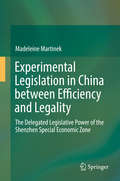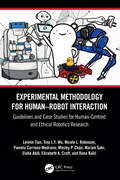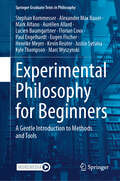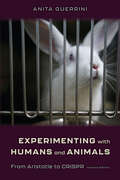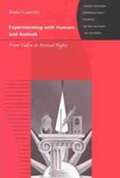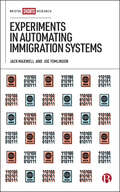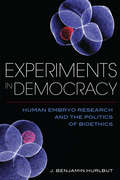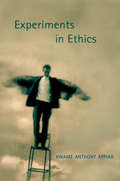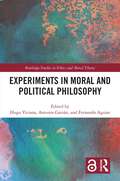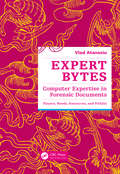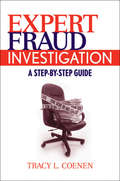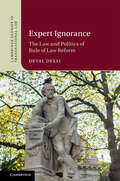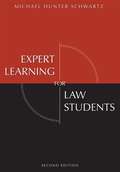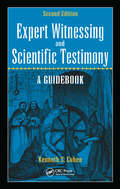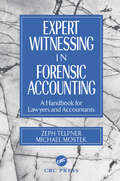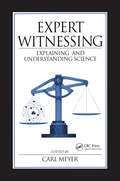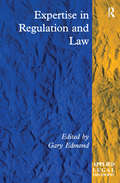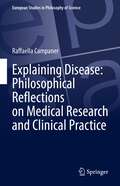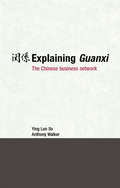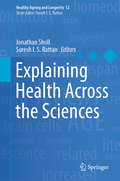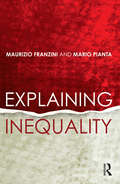- Table View
- List View
Experimental Legislation in China between Efficiency and Legality: The Delegated Legislative Power Of The Shenzhen Special Economic Zone
by Madeleine MartinekThis book analyzes the benefits of and legal concerns in connection with the delegated legislation of the Shenzhen Special Economic Zone as a prime example of experimental legislation in Chinese law. It offers solutions for improving the legal design of experimental regulations in Special Economic Zones by striking a balance between the pursuit of rapid socio-economic progress on the one hand, and the increasing need and will to govern by the rule of law on the other. The book offers a valuable guide for the academic community and legal practitioners, as well as students eager to gain insights into Chinese constitutional law and the conflict between legality and achieving reforms.
Experimental Methodology for Human–Robot Interaction: Guidelines and Case Studies for Human-Centred and Ethical Robotics Research
by Dana Kulić Leimin Tian Tina L.Y. Wu Nicole L. Robinson Pamela Carreno-Medrano Wesley P. Chan Maram Sakr Elahe Abdi Elizabeth A. CroftLeading figures in Australian robotics research provide an overview and guidance for human–robot interaction (HRI) experimental design and evaluation methodologies that consider the ethical implications of the research and its applications from a human-centred and contextual perspective. The authors explain introductory and advanced topics in HRI with a focus on human-centred evaluation and ethical practices. They also provide an online interactive checklist tool for novice HRI researchers and students to deploy when designing their own studies.The book is structured into three parts. In Part I, the authors first review fundamental methodologies and provide an interactive checklist tool of the HRI experimental study life cycle to guide beginners to the field. Part II introduces an expanded set of approaches to support researchers and practitioners to create high-quality study designs that draw on practices from human-computer interaction, human-centred artificial intelligence, psychology and social science, and advance ethical HRI research. Finally, in Part III, the authors discuss a selection of HRI studies as examples of how the introduced methodologies are adopted, which will support the readers to further understand the fundamental and advanced methodologies described in Parts I and II. The diverse collection of case studies enables readers to grasp the state of the art and apply what they have learned in their own practices.This book is a vital resource for both students new to the field and experienced researchers and practitioners. The book’s practical focus and clear elucidation of relevant case studies, from its introduction to the HRI experimental study life cycle through to advanced methods emerging in the field, ensures that this will greatly benefit progress in the field with human-centred and ethical experimental methodology.
Experimental Philosophy for Beginners: A Gentle Introduction to Methods and Tools (Springer Graduate Texts in Philosophy)
by Mark Alfano Justin Sytsma Eugen Fischer Florian Cova Stephan Kornmesser Alexander Max Bauer Aurélien Allard Lucien Baumgartner Paul Engelhardt Henrike Meyer Kevin Reuter Kyle Thompson Marc WyszynskiThis graduate textbook provides a basic introduction to experimental philosophy (x-phi). In nine chapters, different methods and tools used in X-Phi are explained, spanning quantitative vignette studies, interactive experiments, corpus analysis, psycholinguistic experiments as well as qualitative interview studies. Each chapter introduces a specific experimental method by means of a case study in an easily accessible way and covers the whole research process from the development of a research question to the interpretation of the data.
Experimenting with Humans and Animals: From Aristotle to CRISPR (Johns Hopkins Introductory Studies in the History of Science)
by Anita GuerriniExamining the ideas and attitudes that encourage scientists to experiment on living creatures, what their justifications are, and how these have changed over time.Experimentation on animals—particularly humans—is often assumed to be a uniquely modern phenomenon. But the ideas and attitudes that encourage biological and medical scientists to experiment on living creatures date from the earliest expressions of Western thought. In Experimenting with Humans and Animals, Anita Guerrini looks at the history of these practices and examines the philosophical and ethical arguments that justified them.Guerrini discusses key historical episodes in the use of living beings in science and medicine, including the discovery of blood circulation, the development of smallpox and polio vaccines, and recent research in genetics, ecology, and animal behavior. She also explores the rise of the antivivisection movement in Victorian England, the modern animal rights movement, and current debates over gene therapy and genetically engineered animals. We learn how perceptions and understandings of human and animal pain have changed; how ideas of class, race, and gender have defined the human research subject; and that the ethical values of science seldom stray far from the society in which scientists live and work.Thoroughly rewritten and updated, with new material in every chapter, the book emphasizes a broader understanding of experimentation and adds material on gene therapy, self-experimentation, and prisoners and slaves as experimental subjects. A new chapter brings the story up to the present while reflecting on the current regulatory scene, new developments in science, and emerging genomics. Experimenting with Humans and Animals offers readers a context within which to understand more fully the responsibility we all bear for the suffering inflicted on other living beings in the name of scientific knowledge.
Experimenting with Humans and Animals: From Galen to Animal Rights (Johns Hopkins Introductory Studies In The History Ser.)
by Anita GuerriniExperimentation on animals and particularly humans is often assumed to be a uniquely modern phenomenon. But the ideas and attitudes that encourage the biological and medical sciences to experiment on living creatures date from the earliest expression of Western thought. <p><p> In Animal and Human Experimentation, the author looks at the history of these practices from vivisection in ancient Alexandria to present-day battles over animal rights and medical research employing human subjects. The author discusses in-depth key historical episodes in the use of living beings in science and medicine, including the discovery of blood circulation, the development of smallpox and polio vaccines, and recent AIDS research. <p><p> She also explores the rise of the antivivisection movement in Victorian England, the modern animal rights movement, and current debates over gene therapy. In this highly accessible text, we learn how our understanding of an animal's capacity to feel pain has evolved. The author reminds us that the ethical values of science seldom stray far from those of the society in which scientists live and work. Ethical questions about the use of animals and humans in research remain among the most vexing within both the scientific community and society at large. These often rancorous arguments have gone on, however, with little awareness of their historical antecedents. <p><p> Animal and Human Experimentation offers students and concerned general readers on every side of this debate a context within which to understand more fully the responsibility we all bear for the suffering inflicted on other living beings in the name of scientific knowledge.
Experiments in Automating Immigration Systems
by Joe Tomlinson Jack MaxwellIn recent years, the United Kingdom's Home Office has started using automated systems to make immigration decisions. These systems promise faster, more accurate, and cheaper decision-making, but in practice they have exposed people to distress, disruption, and even deportation. This book identifies a pattern of risky experimentation with automated systems in the Home Office. It analyses three recent case studies including: a voice recognition system used to detect fraud in English-language testing; an algorithm for identifying ‘risky’ visa applications; and automated decision-making in the EU Settlement Scheme. The book argues that a precautionary approach is essential to ensure that society benefits from government automation without exposing individuals to unacceptable risks.
Experiments in Democracy: Human Embryo Research and the Politics of Bioethics
by Benjamin HurlbutHuman embryo research touches upon strongly felt moral convictions, and it raises such deep questions about the promise and perils of scientific progress that debate over its development has become a moral and political imperative. From in vitro fertilization to embryonic stem cell research, cloning, and gene editing, Americans have repeatedly struggled with how to define the moral status of the human embryo, whether to limit its experimental uses, and how to contend with sharply divided public moral perspectives on governing science.Experiments in Democracy presents a history of American debates over human embryo research from the late 1960s to the present, exploring their crucial role in shaping norms, practices, and institutions of deliberation governing the ethical challenges of modern bioscience. J. Benjamin Hurlbut details how scientists, bioethicists, policymakers, and other public figures have attempted to answer a question of great consequence: how should the public reason about aspects of science and technology that effect fundamental dimensions of human life? Through a study of one of the most significant science policy controversies in the history of the United States, Experiments in Democracy paints a portrait of the complex relationship between science and democracy, and of U.S. society's evolving approaches to evaluating and governing science's most challenging breakthroughs.
Experiments in Ethics (The Mary Flexner lectures #1)
by Kwame Anthony AppiahIn the past few decades, scientists of human nature—including experimental and cognitive psychologists, neuroscientists, evolutionary theorists, and behavioral economists—have explored the way we arrive at moral judgments. They have called into question commonplaces about character and offered troubling explanations for various moral intuitions. Research like this may help explain what, in fact, we do and feel. But can it tell us what we ought to do or feel? In Experiments in Ethics, the philosopher Kwame Anthony Appiah explores how the new empirical moral psychology relates to the age-old project of philosophical ethics. Some moral theorists hold that the realm of morality must be autonomous of the sciences; others maintain that science undermines the authority of moral reasons. Appiah elaborates a vision of naturalism that resists both temptations. He traces an intellectual genealogy of the burgeoning discipline of “experimental philosophy,” provides a balanced, lucid account of the work being done in this controversial and increasingly influential field, and offers a fresh way of thinking about ethics in the classical tradition. Appiah urges that the relation between empirical research and morality, now so often antagonistic, should be seen in terms of dialogue, not contest. And he shows how experimental philosophy, far from being something new, is actually as old as philosophy itself. Beyond illuminating debates about the connection between psychology and ethics, intuition and theory, his book helps us to rethink the very nature of the philosophical enterprise.
Experiments in International Adjudication: Historical Accounts
by Jorge E. Viñuales Ignacio de la RasillaThe history of international adjudication is all too often presented as a triumphalist narrative of normative and institutional progress that casts aside its uncomfortable memories, its darker legacies and its historical failures. In this narrative, the bulk of 'trials' and 'errors' is left in the dark, confined to oblivion or left for erudition to recall as a curiosity. Written by an interdisciplinary group of lawyers, historians and social scientists, this volume relies on the rich and largely unexplored archive of institutional and legal experimentation since the late nineteenth century to shed new light on the history of international adjudication. It combines contextual accounts of failed, or aborted, as well as of 'successful' experiments to clarify our understanding of the past and present of international adjudication.
Experiments in Moral and Political Philosophy (Routledge Studies in Ethics and Moral Theory)
by Hugo Viciana Antonio Gaitán Fernando AguiarThis volume presents new research on the use of experimental methodologies in moral and social philosophy. The contributions reflect the growing plurality of methodologies and strategies for implementing experimental work on morality to new domains, problems, and topics. Philosophers are exploring the ways in which empirical approaches can transform our idea of the good, our understanding of the social nature of norms and morality, and our methods of fulfilling ethical goals. The chapters in this volume extend experimental work on morality to previously underexplored areas. The contributions in Part 1 explore the methods and foundations of experimental work in areas such as folk moral judgments, metaethical beliefs, moral explanations, and reflective equilibrium. Part 2 focuses on issues in normative ethics and legal and political philosophy such as virtue ethics, utilitarianism, theories of justice, and criminal responsibility. Finally, the chapters in Part 3 tackle various applied ethical issues, including feminist X-Phi, animal welfare, experimental bioethics, and self-driving cars. Experiments in Moral and Political Philosophy will be of interest to scholars and advanced students working in ethics, applied ethics, experimental philosophy, social and political philosophy, and philosophy of law.
Experiments in Moral and Political Philosophy (Routledge Studies in Ethics and Moral Theory)
by Hugo Viciana Antonio Gaitán Fernando AguiarThis volume presents new research on the use of experimental methodologies in moral and social philosophy. The contributions reflect the growing plurality of methodologies and strategies for implementing experimental work on morality to new domains, problems, and topics.Philosophers are exploring the ways in which empirical approaches can transform our idea of the good, our understanding of the social nature of norms and morality, and our methods of fulfilling ethical goals. The chapters in this volume extend experimental work on morality to previously underexplored areas. The contributions in Part 1 explore the methods and foundations of experimental work in areas such as folk moral judgments, metaethical beliefs, moral explanations, and reflective equilibrium. Part 2 focuses on issues in normative ethics and legal and political philosophy such as virtue ethics, utilitarianism, theories of justice, and criminal responsibility. Finally, the chapters in Part 3 tackle various applied ethical issues, including feminist X-Phi, animal welfare, experimental bioethics, and self-driving cars.Experiments in Moral and Political Philosophy will be of interest to scholars and advanced students working in ethics, applied ethics, experimental philosophy, social and political philosophy, and philosophy of law. Chapter 1 and 15 of this book are available for free in PDF format as Open Access from the individual product page at www.taylorfrancis.com. They have been made available under a Creative Commons Attribution-Non Commercial-No Derivatives (CC-BY-NC-ND) 4.0 license.
Expert Bytes: Computer Expertise in Forensic Documents - Players, Needs, Resources and Pitfalls
by Vlad AtanasiuExpert Bytes: Computer Expertise in Forensic Documents Players, Needs, Resources and Pitfallsintroduces computer scientists and forensic document examiners to the computer expertise of forensic documents and assists them with the design of research projects in this interdisciplinary field. This is not a textbook on how to perform the actua
Expert Evidence and International Criminal Justice
by Artur AppazovThe book is a comprehensive narration of the use of expertise in international criminal trials offering reflection on standards concerning the quality and presentation of expert evidence. It analyzes and critiques the rules governing expert evidence in international criminal trials and the strategies employed by counsel and courts relying upon expert evidence and challenges that courts face determining its reliability. In particular, the author considers how the procedural and evidentiary architecture of international criminal courts and tribunals influences the courts' ability to meaningfully incorporate expert evidence into the rational fact-finding process. The book provides analysis of the unique properties of expert evidence as compared with other forms of evidence and the challenges that these properties present for fact-finding in international criminal trials. It draws conclusions about the extent to which particularized evidentiary rules for expert evidence in international criminal trials is wanting. Based on comparative analyses of relevant national practices, the book proposes procedural improvements to address some of the challenges associated with the use of expertise in international criminal trials.
Expert Fraud Investigation
by Tracy L. CoenenA fraud investigation is aimed at examining evidence to determine if a fraud occurred, how it happened, who was involved, and how much money was lost. Investigations occur in cases ranging from embezzlement, to falsification of financial statements, to suspicious insurance claims. Expert Fraud Investigation: A Step-by-Step Guide provides all the tools to conduct a fraud investigation, detailing when and how to investigate. This guide takes the professional from the point of opening an investigation, selecting a team, gathering data, and through the entire investigation process. Business executives, auditors, and security professionals will benefit from this book, and companies will find this a useful tool for fighting fraud within their own organizations.
Expert Ignorance: The Law and Politics of Rule of Law Reform (Cambridge Studies in Transnational Law)
by Deval DesaiToday, a transnational constellation of 'rule of law' experts advise on 'good' legal systems to countries in the Global South. Yet these experts often claim that the 'rule of law' is nearly impossible to define, and they frequently point to the limits of their own expertise. In this innovative book, Deval Desai identifies this form of expertise as 'expert ignorance'. Adopting an interdisciplinary approach, Desai draws on insights from legal theory, sociology, development studies, and performance studies to explore how this paradoxical form of expertise works in practice. With a range of illustrative cases that span both global and local perspectives, this book considers the impact of expert ignorance on the rule of law and on expert governance more broadly. Contributing to the study of transnational law, governance, and expertise, Desai demonstrates the enduring power of proclaiming what one does not know. This title is available as Open Access on Cambridge Core.
Expert Learning for Law Students
by Michael SchwartzExpert Learning for Law Students is designed to help law students build the analytical skills necessary to succeed in law school, on the bar exam, and in law practice. This book reveals how successful law students and lawyers plan, monitor, and implement their work and it provides detailed guidance regarding individual student personality types and learning styles. The accompanying workbook includes questions and exercises to assist students in practicing the concepts explained in the text. The second edition includes greater emphasis on students personalizing all strategy suggestions by adapting strategies to their individual learning styles, personality types, and, most importantly, their results and their evaluations of the causes of those results. It includes additional materials designed to help students deal with law school stress and offers insights for ameliorating that stress developed within the Humanizing Legal Education movement. Tips on time management and avoiding procrastination; a revised discussion on case reading reflecting recent research; a new section on using color as a memorization tool; and a revised discussion of how to apply rules to facts and how to apply and distinguish cases are also provided.
Expert Witnessing and Scientific Testimony: A Guidebook, Second Edition
by Kenneth S. CohenBased on the author‘s more than 35 years of experience as a successful expert witness, this revised and expanded edition of Expert Witnessing and Scientific Testimony: A Guidebook demonstrates how to properly present scientific, criminal, and forensic testimony and survive the onslaught of cross-examination in court. It presents material in a step-
Expert Witnessing in Forensic Accounting: A Handbook for Lawyers and Accountants (Expert Witnessing)
by Zeph Telpner Michael MostekFrom opposing the local CPA to tackling the Big Five - Everything you need to know about accounting in the courtroomWith the recent boom in litigation and malpractice charges concerning tax, accounting, financial litigation, and fraud disputes, more and more accounting professionals are being hired as expert witnesses. Yet, few lawyers have
Expert Witnessing: Explaining and Understanding Science
by Carl MeyerCommunication problems between science and the courts are widely deplored and sometimes exploited by a variety of groups. The U.S. Supreme Court has twice tightened the law of evidence to control the flow of information, but amazingly little has been written to analyze the nature of the problem and reduce the barriers. Expert Witnesses: Explaining and Understanding Science results from the first-hand experience of the contributors-who include scientists, expert witnesses, litigators, and a judge-that the cultural and interdisciplinary communications barriers between science and the law can be greatly reduced to everybody's advantage if the parties understand and respect each other's needs and positions.
Expertise in Regulation and Law (Applied Legal Philosophy)
by Edmond GaryThis collection of essays examines the multi-faceted roles of experts and expertise in and around contemporary legal and regulatory cultures. The essays illustrate the complexity intrinsic to the production and use of expert knowledge, particularly during transition from specialist communities to other domains such as policy formulation, regulatory standard setting and litigation. Several themes pervade the collection. These include the need to recognize that: expert knowledge and opinion is often complex, controversial and contested; there are no simple criteria for resolving disagreements between experts; appeals to 'objectivity' and 'impartiality' tend to be rhetorical rather than analytical; contests in expertise are frequently episodes in larger campaigns; there are many different models of expertise and knowledge; processes designed to deal with expert knowledge are unavoidably political; questions around who is an expert and what should count as expertise are not always self-evident; and the evidence rarely 'speaks for itself'.
Experts, Networks and International Law
by Joanna Harrington Holly Cullen Catherine RenshawHighlighting how the challenges raised by globalization - from environmental management to financial sector meltdowns - have encouraged the emergence of experts and networks as powerful actors in international governance, the contributions in this collection assess the methods and effectiveness of these new actors. Unlike other books that have focused on networks or experts, this volume brings these players together, showing how they interact and share the challenges of establishing legitimacy and justifying their power and influence. The collection shows how experts and networks function in different ways to address diverse problems across multiple borders. The reader is provided with a broader and deeper practical understanding of how informal authority actually operates, and of the nature of the relationship between different actors involved in policymaking. Through a range of case studies, the contributions in this collection explain how globalization is reshaping traditional forms of power and authority.
Explaining Disease: Philosophical Reflections on Medical Research and Clinical Practice (European Studies in Philosophy of Science)
by Raffaella CampanerThis interdisciplinary monograph in philosophy of medicine examines models of explanation in health science and their relation with current medical trends, such as personalized and person-centered medicine. Medicine has provided challenging case studies for the general philosophy of science that have prompted rethinking of a wide range of philosophical notions – such as scientific law, theory and evidence – and contributed to the elaboration of pluralistic approaches to modeling, causality and explanation. The health sciences have increasingly recognized the role of philosophy of medicine as both a field of conceptual and methodological reflection, capable of addressing practical issues, and hence relevant for a proper understanding of the construction of medical knowledge, modeling practices, therapeutic strategies and preventive decisions.'Explaining Disease' contains various case studies in medicine to describe the assumptions underpinning the construction of explanatory models of diseases. It shows the impact different explanatory strategies can have on practical matters, which in turn affect clinical evaluation and therapy and public health decisions. The book concludes with a few open-ended reflections to foster more thorough consideration of the role of philosophy of medicine can play its dialogue with the health sciences. [this sounds wrong. Either: of the role of philosophy of medicine in its dialogue with the sciences, or: of the role philosophy of medicine can play in its dialogue with the health sciences.
Explaining Guanxi: The Chinese Business Network
by Anthony Walker Ying Lun SoGuanxi, a system of Chinese business relationships, is often described, but is rarely fully understood. Though it seems intangible, there is no doubt that it has contributed significantly to the success of Chinese entrepreneurs and the places where they work. Translated loosely as ‘personal ties’, this simple explanation belies a complex and nuanced system. Guanxi has often been criticised as nepotism - unfair, inefficient, even corrupt, and generally detrimental to business and economic growth… but if it is that bad, how does it survive? This insightful book unravels the origins of Guanxi and provides a much-needed explanation of the phenomena. It investigates: why it was initiated and developed what function it serves how it is maintained why it is such a dominant phenomenon in Chinese business life Combining economics, law and culture, this clear and concise book looks to the future of Guanxi based on its history. Drawing on cultural, organizational and economic studies, it takes a multi-disciplinary approach, integrating these various topics into a coherent explanation of Guanxi ensuring that this illuminating book will be equally useful to students of Asian business as to practitioners working within this market.
Explaining Health Across the Sciences (Healthy Ageing and Longevity #12)
by Suresh I. S. Rattan Jonathan ShollThis edited volume aims to better understand the multifaceted phenomenon we call health. Going beyond simple views of health as the absence of disease or as complete well-being, this book unites scientists and philosophers. The contributions clarify the links between health and adaptation, robustness, resilience, or dynamic homeostasis, and discuss how to achieve health and healthy aging through practices such as hormesis. The book is divided into three parts and a conclusion: the first part explains health from within specific disciplines, the second part explores health from the perspective of a bodily part, system, function, or even the environment in which organisms live, and the final part looks at more clinical or practical perspectives. It thereby gathers, across 30 chapters, diverse perspectives from the broad fields of evolutionary and systems biology, immunology, and biogerontology, more specific areas such as odontology, cardiology, neurology, and public health, as well as philosophical reflections on mental health, sexuality, authenticity and medical theories. The overarching aim is to inform, inspire and encourage intellectuals from various disciplines to assess whether explanations in these disparate fields and across biological levels can be sufficiently systematized and unified to clarify the complexity of health. It will be particularly useful for medical graduates, philosophy graduates and research professionals in the life sciences and general medicine, as well as for upper-level graduate philosophy of science students.
Explaining Inequality
by Maurizio Franzini Mario PiantaInequalities in incomes and wealth have increased in advanced countries, making our economies less dynamic, our societies more unjust and our political processes less democratic. As a result, reducing inequalities is now a major economic, social and political challenge. This book provides a concise yet comprehensive overview of the economics of inequality. Until recently economic inequality has been the object of limited research efforts, attracting only modest attention in the political arena; despite important advances in the knowledge of its dimensions, a convincing understanding of the mechanisms at its roots is still lacking. This book summarizes the topic and provides an interpretation of the mechanisms responsible for increased disparities. Building on this analysis the book argues for an integrated set of policies addressing the roots of inequalities in incomes and wealth Explaining Inequality will be of interest to students, researchers and practitioners concerned with inequality, economic and public policy and political economy.
